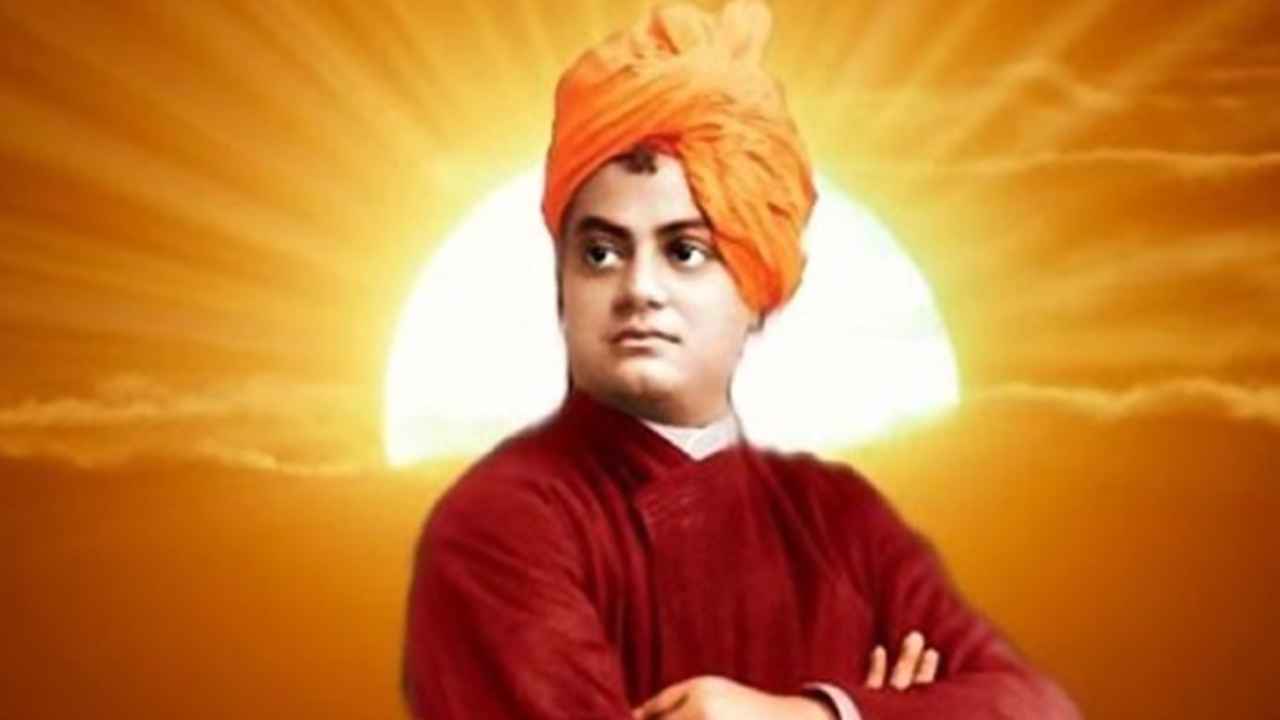Swami Vivekananda Jayanti: Swami Vivekananda, known in his pre-monastic life as Narendra Nath Datta, was born in an affluent family in Kolkata on 12 January 1863.
His father, Vishwanath Datta, was a successful attorney with interests in a wide range of subjects, and his mother, Bhuvaneshwari Devi, was endowed with deep devotion, strong character and other qualities.
A precocious boy, Narendra excelled in music, gymnastics and studies. By the time he graduated from Calcutta University, he had acquired a vast knowledge of different subjects, especially Western philosophy and history.
Born with a yogic temperament, he used to practise meditation even from his boyhood, and was associated with Brahmo Movement for some time.
Swami Vivekananda Jayanti : Awareness of Life’s Mission
After establishing the new monastic order, Vivekananda heard the inner call for a greater mission in his life. While most of the followers of Sri Ramakrishna thought of him in relation to their own personal lives, Vivekananda thought of the Master in relation to India and the rest of the world.
As the prophet of the present age, what was Sri Ramakrishna’s message to the modern world and to India in particular? This question and the awareness of his own inherent powers urged Swamiji to go out alone into the wide world.
So in the middle of 1890, after receiving the blessings of Sri Sarada Devi, the divine consort of Sri Ramakrishna, known to the world as Holy Mother, who was then staying in Kolkata, Swamiji left Baranagar Math and embarked on a long journey of exploration and discovery of India.
National Youth Day 2022: Date, history, significance and inspirational quotes
Swami Vivekananda: Discovery of Real India
During his travels all over India, Swami Vivekananda was deeply moved to see the appalling poverty and backwardness of the masses. He was the first religious leader in India to understand and openly declare that the real cause of India’s downfall was the neglect of the masses.
The immediate need was to provide food and other bare necessities of life to the hungry millions. For this they should be taught improved methods of agriculture, village industries, etc.
It was in this context that Vivekananda grasped the crux of the problem of poverty in India (which had escaped the attention of social reformers of his days): owing to centuries of oppression, the downtrodden masses had lost faith in their capacity to improve their lot.
It was first of all necessary to infuse into their minds faith in themselves. For this they needed a life-giving, inspiring message. Swamiji found this message in the principle of the Atman, the doctrine of the potential divinity of the soul, taught in Vedanta, the ancient system of religious philosophy of India.
He saw that, in spite of poverty, the masses clung to religion, but they had never been taught the life-giving, ennobling principles of Vedanta and how to apply them in practical life.
Thus the masses needed two kinds of knowledge: secular knowledge to improve their economic condition, and spiritual knowledge to infuse in them faith in themselves and strengthen their moral sense.
The next question was, how to spread these two kinds of knowledge among the masses? Through education this was the answer that Swamiji found.
National Youth Day 2022: Wishes and quotes to share on Swami Vivekananda Jayanti
Swami Vivekananda Jayanti : Swamiji’s Contributions to India:
In spite of her innumerable linguistic, ethnic, historical and regional diversities, India has had from time immemorial a strong sense of cultural unity. It was, however, Swami Vivekananda who revealed the true foundations of this culture and thus clearly defined and strengthened the sense of unity as a nation.
Swamiji gave Indians proper understanding of their country’s great spiritual heritage and thus gave them pride in their past. Furthermore, he pointed out to Indians the drawbacks of Western culture and the need for India’s contribution to overcome these drawbacks. In this way Swamiji made India a nation with a global mission.
Sense of unity, pride in the past, sense of mission these were the factors which gave real strength and purpose to India’s nationalist movement. Several eminent leaders of India’s freedom movement have acknowledged their indebtedness to Swamiji.
Free India’s first Prime Minister Jawaharlal Nehru wrote: “Rooted in the past, full of pride in India’s prestige, Vivekananda was yet modern in his approach to life’s problems, and was a kind of bridge between the past of India and her present, he came as a tonic to the depressed and demoralized Hindu mind and gave it self-reliance and some roots in the past.”
Netaji Subhash Chandra Bose wrote: “Swamiji harmonized the East and the West, religion and science, past and present. And that is why he is great. Our countrymen have gained unprecedented self-respect, self-reliance and self-assertion from his teachings.”
Swamiji’s most unique contribution to the creation of new India was to open the minds of Indians to their duty to the downtrodden masses. Long before the ideas of Karl Marx were known in India, Swamiji spoke about the role of the laboring classes in the production of the country’s wealth.
Swamiji was the first religious leader in India to speak for the masses, formulate a definite philosophy of service, and organize large-scale social service.
Swami Vivekananda’s Contributions to Hinduism:
Identity: It was Swami Vivekananda who gave to Hinduism as a whole a clear-cut identity, a distinct profile. Before Swamiji came Hinduism was a loose confederation of many different sects.
Swamiji was the first religious leader to speak about the common bases of Hinduism and the common ground of all sects.
He was the first person, as guided by his Master Sri Ramakrishna, to accept all Hindu doctrines and the views of all Hindu philosophers and sects as different aspects of one total view of Reality and way of life known as Hinduism.
Speaking about Swamiji’s role in giving Hinduism its distinct identity, Sister Nivedita wrote: “… it may be said that when he began to speak it was of ‘the religious ideas of the Hindus’, but when he ended, Hinduism had been created.”
Unification: Before Swamiji came, there was a lot of quarrel and competition among the various sects of Hinduism. Similarly, the protagonists of different systems and schools of philosophy were claiming their views to be the only true and valid ones.
By applying Sri Ramakrishna’s doctrine of Harmony (Samanvaya) Swamiji brought about an overall unification of Hinduism on the basis of the principle of unity in diversity.
Speaking about Swamiji’s role in this field K M Pannikar, the eminent historian and diplomat, wrote: “This new Shankaracharya may well be claimed to be a unifier of Hindu ideology.”
Defense: Another important service rendered by Swamiji was to raise his voice in defense of Hinduism. In fact, this was one of the main types of work he did in the West.
Christian missionary propaganda had given a wrong understanding of Hinduism and India in Western minds. Swamiji had to face a lot of opposition in his attempts to defend Hinduism.
Meeting the Challenges: At the end of the 19th century, India in general, and Hinduism in particular, faced grave challenges from Western materialistic life, the ideas of Western free society, and the proselytizing activities of Christians.
Vivekananda met these challenges by integrating the best elements of Western culture in Hindu culture.
New Ideal of Monasticism: A major contribution of Vivekananda to Hinduism is the rejuvenation and modernization of monasticism.
In this new monastic ideal, followed in the Ramakrishna Order, the ancient principles of renunciation and God realization are combined with service to God in man (Shiva jnane jiva seva). Vivekananda elevated social service to the status of divine service.
Refurbishing of Hindu Philosophy and Religious Doctrines: Vivekananda did not merely interpret ancient Hindu scriptures and philosophical ideas in terms of modern thought.
He also added several illuminating original concepts based on his own transcendental experiences and vision of the future. This, however, needs a detailed study of Hindu philosophy which cannot be attempted here.
Selected Teachings of Swami Vivekananda:
- My ideal, indeed, can be put into a few words, and that is: to preach unto mankind their divinity, and how to make it manifest in every movement of life.
- Education is the manifestation of perfection already in man.
- We want that education by which character is formed, strength of mind is increased, the intellect is expanded, and by which one can stand on one’s own feet.
- So long as the millions live in hunger and ignorance, I hold every man a traitor who, having been educated at their expense, pays not the least heed to them.
- Whatever you think, that you will be. If you think yourselves weak, weak you will be; if you think yourselves strong, strong you will be.
- If you have faith in all the three hundred and thirty millions of your mythological gods, … and still have no faith in yourselves, there is no salvation for you. Have faith in yourselves, and stand up on that faith and be strong; that is what we need.
- Strength, strength it is that we want so much in this life, for what we call sin and sorrow have all one cause, and that is our weakness. With weakness comes ignorance, and with ignorance comes misery.
- The older I grow, the more everything seems to me to lie in manliness. This is my new Gospel.
- Purity, patience, and perseverance are the three essentials to success, and above all, love.
- Religion is realization; not talk, not doctrine, nor theories, however beautiful they may be. It is being and becoming, not hearing or acknowledging; it is the whole soul becoming changed into what it believes.
- Religion is the manifestation of the Divinity already in man.
- Teach yourselves, teach everyone his real nature, call upon the sleeping soul and see how it awakes. Power will come, glory will come, goodness will come, purity will come, and everything that is excellent will come when this sleeping soul is roused to self-conscious activity.
- They alone live who live for others, the rest are more dead than alive.
- This is the gist of all worship to be pure and to do good to others.
- It is love and love alone that I preach, and I base my teaching on the great Vedantic truth of the sameness and omnipresence of the Soul of the Universe.
















